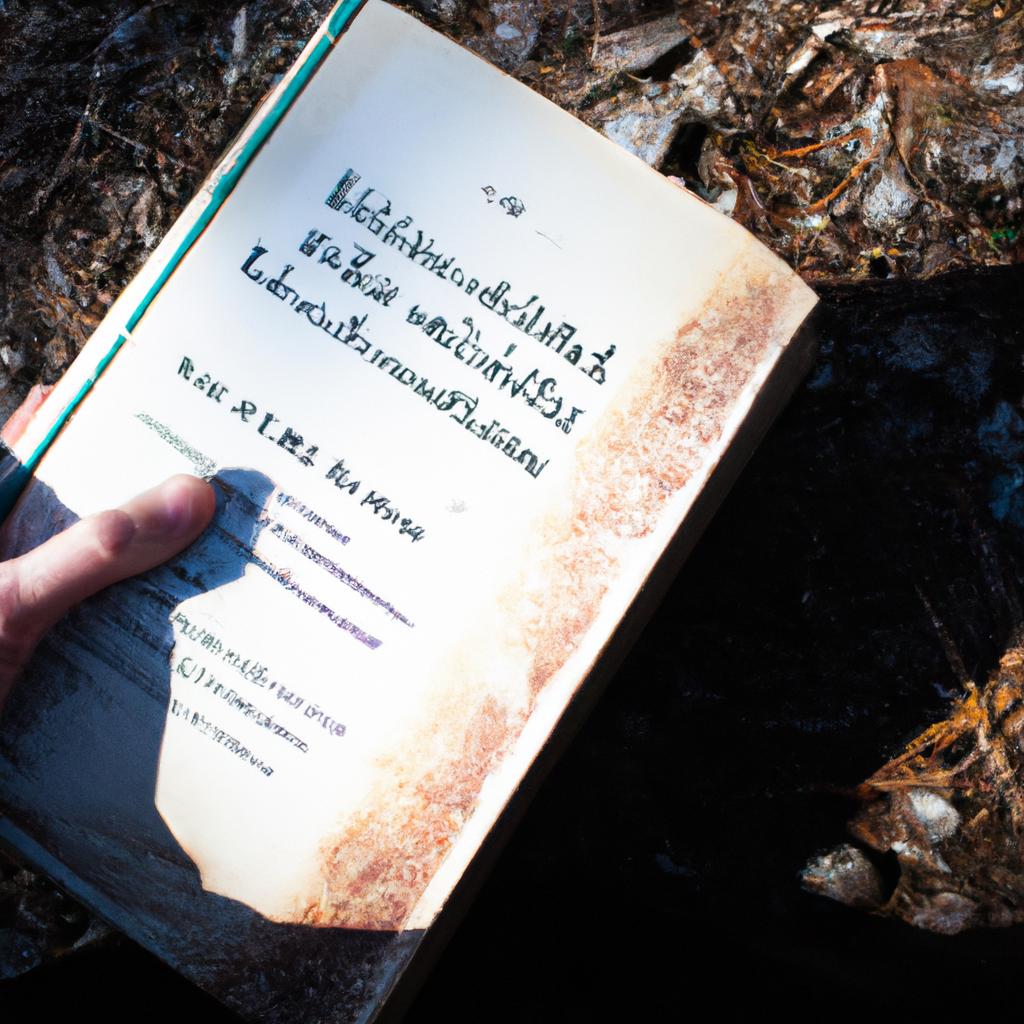Skepticism in Epistemology: An Informative Exploration

Skepticism in epistemology, a branch of philosophy concerned with the nature and scope of knowledge, has long been a subject of intense debate and inquiry. It challenges our assumptions about what we can truly know and raises thought-provoking questions that have captivated philosophers throughout history. For instance, imagine an individual named Alex who is presented with two conflicting pieces of evidence regarding climate change: one from a trusted scientific study and another from a prominent climate change skeptic. How does Alex navigate this situation? Can they confidently determine which claim is true? These are precisely the kinds of dilemmas that skepticism in epistemology seeks to explore.
At its core, skepticism calls into question the reliability and certainty of our beliefs and knowledge claims. It challenges us to critically examine the foundations upon which our understanding rests and exposes potential gaps or limitations within them. By adopting a skeptical stance, philosophers aim to uncover biases, cognitive shortcuts, and fallacies that may hinder accurate reasoning or lead to erroneous conclusions. Additionally, skepticism highlights the importance of justification for our beliefs – demanding rigorous evidential support as a means to distinguish between justified belief and mere opinion.
This article aims to provide an informative exploration of skepticism in epistemology by delving into its historical roots, major arguments, and contemporary debates. It will examine key skeptical positions such as the Cartesian skepticism of external world and the problem of induction, which challenges our ability to make reliable generalizations based on past experiences. The article will also discuss responses to skepticism, including foundationalism, coherentism, and contextualism.
Furthermore, this article will explore how skepticism intersects with other areas of philosophy, such as ethics and metaphysics. For instance, it may raise questions about moral knowledge or the nature of reality itself. Skepticism can also have practical implications in fields like science and politics, where critical thinking and evidence-based reasoning are crucial.
Ultimately, this article aims to encourage readers to engage with skepticism in epistemology and develop their own informed perspectives. By grappling with the challenges posed by skepticism, individuals can cultivate a more robust understanding of knowledge claims, learn to critically evaluate evidence and arguments, and become more intellectually rigorous thinkers.
Please let me know if there’s anything specific you’d like me to elaborate on or if you have any further questions!
The Nature of Skepticism
The Nature of Skepticism
Imagine a scenario where you wake up one day and find yourself in an unfamiliar city. You see towering buildings, bustling streets, and people going about their daily lives. However, as you take a closer look, doubts start to creep into your mind. Are the sights before you real or merely figments of your imagination? This momentary skepticism exemplifies the philosophical concept that has intrigued thinkers for centuries – skepticism in epistemology.
Skepticism is characterized by a profound questioning of our ability to know things with certainty. It challenges the very foundation upon which knowledge claims are built and scrutinizes the reliability of our senses, reasoning abilities, and even the existence of an external world beyond our subjective experiences. Within this context, it becomes essential to explore the nature of skepticism more deeply.
To grasp its multifaceted nature, we can consider four key aspects:
- Doubt: The skeptic’s fundamental stance revolves around doubt – doubting everything from everyday beliefs to complex scientific theories. This pervasive doubt serves as a cornerstone for skeptical inquiry.
- Evidential Basis: Skeptics emphasize the importance of sufficient evidence as a basis for knowledge claims. Without proper evidential support, they argue that any belief remains questionable.
- Critical Examination: Central to skepticism is engaging in rigorous critical examination of ideas and arguments. By subjecting assertions to scrutiny through logical analysis and empirical investigation, skeptics seek to uncover flaws and weaknesses.
- Epistemic Limitations: Skepticism acknowledges inherent limitations in human cognition and perception. These limitations bring forth questions about whether absolute certainty can ever be achieved.
Consider the following table showcasing different forms of skepticism throughout history:
| Historical Perspective | Key Ideas |
|---|---|
| Ancient Greek Pyrrhonism | Suspending judgment |
| Cartesian Methodological Doubt | Doubting through systematic questioning |
| Humean Skepticism | Challenging causality and induction |
| Contemporary Contextual Skepticism | Questioning the reliability of specific domains such as memory or perception |
As we delve into this exploration of skepticism, it is crucial to recognize that the nature of skepticism extends beyond mere doubt. It encompasses critical thinking, rigorous examination, and an understanding of our epistemic limitations. In light of these considerations, let us now turn our attention to the historical perspectives on skepticism.
Transition Sentence: With a firm grasp on the multifaceted nature of skepticism, we can now examine its historical perspectives.
Historical Perspectives on Skepticism
Section H2: The Nature of Skepticism
Having explored the fundamental nature of skepticism in epistemology, we now delve into a fascinating examination of historical perspectives on this intricate subject. To illustrate the significance and implications of skepticism, let us consider a hypothetical scenario involving an individual named Sarah.
Sarah is an ambitious and diligent student who has always excelled academically. However, she encounters a series of thought-provoking challenges when presented with conflicting information regarding her favorite historical event – the moon landing. As Sarah seeks to uncover the truth about this iconic moment in human history, she finds herself torn between various sources that offer contrasting narratives and evidence.
This brings us to the emotional impact of skepticism – it can evoke feelings of confusion, doubt, and even frustration among individuals grappling with divergent viewpoints. To further understand this phenomenon, here are some key points to consider:
- Skepticism prompts introspection and critical thinking.
- It encourages intellectual humility as one recognizes the limitations of knowledge.
- Skeptics often question authority and challenge established beliefs.
- Engaging with skepticism fosters intellectual growth and open-mindedness.
To provide a visual representation of these ideas, consider the following table:
| Emotional Impact | Cognitive Effect | Result |
|---|---|---|
| Confusion | Critical Thinking | Intellectual Development |
| Doubt | Introspection | Challenging Conventional Wisdom |
| Frustration | Humility | Expanding Perspective |
As we contemplate these aspects within skepticism’s realm, it becomes clear that its influence extends far beyond mere philosophical discourse. By encouraging individuals to probe deeper into their own beliefs and scrutinize prevailing narratives, skepticism serves as a catalyst for personal growth and societal progress.
Transitioning seamlessly into our next section on “Arguments Against Skepticism,” we continue our exploration by examining counterarguments that challenge skeptical positions.
Arguments Against Skepticism
In exploring skepticism within epistemology, it is crucial to delve into the problem of induction. This issue arises when attempting to justify our beliefs based on past observations or experiences. To illustrate this conundrum, let us consider a hypothetical scenario: imagine a scientist who has conducted numerous experiments supporting the hypothesis that all swans are white. Based on these empirical findings, the scientist confidently asserts that there are no black swans in existence. However, upon encountering an unexpected black swan during further research, doubt begins to creep in.
To better understand the challenges posed by the problem of induction, we can examine several key aspects:
-
Reliance on past data: The scientist’s initial belief about all swans being white was grounded in previous observations. Yet, as demonstrated by the discovery of a black swan, relying solely on past data may not provide sufficient evidence for universal claims.
-
Generalization and limited scope: When drawing conclusions from specific instances (such as observing only white swans), there is always a risk of overgeneralizing beyond what available evidence allows. In this case, assuming all swans are white based solely on observed examples could lead to erroneous beliefs.
-
Confirmation bias: Our tendency to seek out information that confirms our pre-existing beliefs can also contribute to the problem of induction. If the scientist had actively disregarded any conflicting evidence or alternative perspectives regarding swan coloration, their confidence in their original claim would remain unchallenged until confronted with contradictory data.
-
Uncertainty and provisional knowledge: The presence of uncertainty should be acknowledged when dealing with inductive reasoning processes. Recognizing that our knowledge is inherently fallible prompts us to adopt a more cautious approach rather than making absolute claims without room for revision.
A table visualizing some potential implications arising from the problem of induction:
| Implications | Examples |
|---|---|
| Limited scope of observations | Believing all dogs are friendly after only encountering friendly dogs |
| Overgeneralization | Assuming all politicians are corrupt based on a few instances of corruption |
| Confirmation bias | Ignoring evidence that challenges one’s religious beliefs |
| Uncertainty in knowledge | Recognizing the limitations of scientific theories and accepting the possibility of future revisions |
As we can see, the problem of induction raises significant concerns when it comes to justifying our beliefs. Acknowledging these challenges is vital for fostering intellectual humility and maintaining an open mind towards new information. In light of this understanding, let us now turn our attention to examining how skepticism intersects with the problem of induction.
Skepticism and the Problem of Induction
Section H2: Skepticism and the Problem of Induction
In our exploration of skepticism in epistemology, we have encountered various arguments against skepticism that challenge its validity. However, a fundamental question remains: how does skepticism relate to the problem of induction? To shed light on this connection, let us consider an example.
Imagine a scientist who has conducted numerous experiments on a particular chemical reaction. Based on these observations, the scientist formulates a hypothesis about how the reaction will occur under specific conditions. The scientist carries out additional experiments, which consistently support their initial hypothesis. At this point, it seems reasonable for the scientist to conclude that their hypothesis is true and reliable.
However, skepticism raises doubts about such conclusions by highlighting the problem of induction. This philosophical problem questions our ability to make universal claims based solely on past experiences or empirical evidence. It argues that just because something has always happened in a certain way in the past does not guarantee that it will continue happening in the same manner in the future. Therefore, skeptics argue that even if all our previous observations support a particular claim, there is no certainty that it will hold true indefinitely.
To further understand this relationship between skepticism and the problem of induction, let us examine some key points:
- The problem of induction challenges our reliance on past experience as a basis for knowledge.
- Skepticism questions whether we can ever reach absolute certainty about any belief or claim.
- Both concepts highlight inherent limitations in human cognition and perception.
- They invite us to critically analyze our assumptions and acknowledge uncertainties in our understanding.
- Uncertainty can be unsettling but also liberating.
- Questioning established beliefs allows room for growth and intellectual development.
- Recognizing limitations humbles us and fosters empathy towards diverse perspectives.
- Embracing uncertainty encourages curiosity and open-mindedness.
Now turning our attention to “Skepticism and the External World,” we will delve into the implications of skepticism on our knowledge and perception of reality. By examining how skepticism challenges our understanding of the external world, we can further deepen our exploration of this intriguing philosophical concept.
Skepticism and the External World
Building upon the examination of skepticism and its relation to the problem of induction, we now turn our attention to another significant aspect within the realm of epistemology – skepticism in relation to the external world. As we delve deeper into this exploration, it is crucial to consider how skepticism challenges our understanding of reality and knowledge.
Section H2: Skepticism and the External World
To illustrate the implications of skepticism regarding the external world, let us consider a hypothetical scenario. Imagine waking up one day with an entirely altered perception of your surroundings. The once familiar objects and people appear distorted, leading you to question whether what you perceive corresponds to any objective truth or if it is merely an illusion created by your own mind. This unsettling situation highlights the fundamental questions skeptics raise about our ability to accurately know and understand the external world.
In examining skepticism’s impact on our comprehension of reality, several key points emerge:
- Skepticism demands rigorous inquiry: By challenging our assumptions and questioning the reliability of our senses, skeptics prompt us to engage in critical thinking and seek evidential support for our beliefs.
- It reveals inherent limitations: Skepticism exposes the fallibility of human cognition, reminding us that there may be aspects beyond our grasp due to cognitive biases or perceptual constraints.
- It emphasizes subjectivity: Acknowledging skepticism forces us to confront the subjective nature of individual experiences and recognize that different perspectives can give rise to conflicting interpretations.
- It inspires intellectual humility: Grappling with skeptical arguments encourages humility in acknowledging that absolute certainty may be unattainable, fostering a willingness to reconsider previously held convictions.
| Implications | Description |
|---|---|
| Demand for evidence | Skepticism compels individuals to seek robust evidence before accepting claims as true. |
| Recognition of uncertainty | Skepticism prompts acknowledgment that uncertainties exist even in seemingly concrete matters. |
| Heightened awareness | Skepticism fosters a heightened awareness of cognitive biases and the potential for fallacious reasoning. |
| Necessity for critical thinking | Skepticism necessitates the development of critical thinking skills to evaluate arguments and evidence objectively. |
As we conclude this section, it becomes evident that skepticism regarding the external world raises profound philosophical questions about our perception, understanding, and knowledge. The hypothetical scenario presented serves as a reminder that our interpretations are not infallible representations of reality but rather subjective constructs influenced by various factors. With this in mind, let us now explore another facet within the realm of epistemology – skepticism and its implications on the limits of knowledge.
Continuing our examination of skepticism, we will now delve into its relationship with the limits of knowledge in an attempt to further unravel the complexities surrounding human cognition.
Skepticism and the Limits of Knowledge
Section H2: Skepticism and the Limits of Knowledge
Having explored skepticism in relation to the external world, we now turn our attention towards its implications for the limits of knowledge. How does skepticism challenge our understanding of what can be known? To shed light on this question, let us consider a hypothetical scenario.
Imagine a renowned archaeologist embarking on an expedition to uncover ancient artifacts hidden deep within a remote rainforest. Armed with extensive knowledge and experience in their field, they embark on this journey with great enthusiasm. However, upon arriving at their destination, they are met with unforeseen challenges – impenetrable vegetation, treacherous terrain, and limited resources. Despite their expertise and preparations, they find themselves unable to access certain areas or gather all the evidence needed to support their claims about the civilization that once thrived there.
This example highlights some of the limitations inherent in acquiring knowledge. In exploring skepticism’s impact on the bounds of human understanding, several key points arise:
- Fallibility of perception: Our senses provide us with information about the world around us but are susceptible to errors and limitations. Illusions, hallucinations, and sensory biases remind us that what appears obvious may not always align with reality.
- Subjectivity of interpretation: Even if we manage to perceive something accurately, interpreting it is another matter altogether. Our individual backgrounds, beliefs, and biases shape how we understand and make sense of information.
- Uncertainty amidst complexity: Knowledge acquisition often involves grappling with complex phenomena that defy simplistic explanations. As we delve deeper into intricate subjects such as quantum physics or theories concerning consciousness, uncertainty becomes more pronounced.
- Epistemic gaps: There exist realms of inquiry where our current methods fall short or remain inadequate. Questions surrounding metaphysics or moral dilemmas might elude definitive answers due to inherent ambiguities or lack of empirical data.
| Limitations | Implications |
|---|---|
| Fallibility of perception | Challenges the reliability of our senses and raises doubts about direct access to reality. |
| Subjectivity of interpretation | Raises questions about objectivity and highlights the role of personal biases in shaping knowledge. |
| Uncertainty amidst complexity | Acknowledges that some areas of inquiry may remain elusive or resistant to definitive understanding. |
| Epistemic gaps | Recognizes the existence of philosophical, metaphysical, or ethical quandaries for which no conclusive answers currently exist. |
In conclusion, skepticism confronts us with profound uncertainties regarding the limits of human knowledge. Our perceptions can be fallible, interpretations subjective, and certain domains elude clear-cut resolutions. This recognition encourages a humble approach to knowledge acquisition – one that embraces curiosity while acknowledging the vast expanse of what we do not yet comprehend.
(Note: The table should be formatted in markdown syntax when used outside this interface.)






